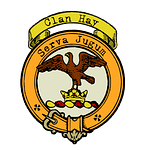Welcome back to "A Clan A Day Podcast" brought to you by bagtownclans.com. I'm your host, Colin MacDonald. Today, we're exploring the remarkable history of Clan Macrae, a Highland Scottish clan whose roots run deep in the rugged landscape of Ross-shire. Known for their fierce loyalty, martial prowess, and cultural contributions, the Macraes have a rich history that's as fascinating as it is diverse.
The name Macrae, sometimes spelled MacRa or MacRath, derives from the Gaelic "MacRath," meaning "son of grace" or "son of good fortune." This name reflects the clan's early reputation for being fortunate in battle and life. Although their name suggests good luck, the Macraes have earned their legacy through their strength, courage, and unwavering loyalty to their allies.
Clan Macrae's origins are somewhat shrouded in mystery, with several competing traditions about where they came from. Some suggest the Macraes are of pure Gaelic stock, indigenous to the Scottish Highlands. Others claim they trace their roots back to Ireland, sharing a common ancestry with the Mackenzies and Macleans. According to one tradition, the Macraes arrived in Scotland in the 13th century alongside Colin Fitzgerald, the supposed founder of Clan Mackenzie. The Macraes were so closely aligned with the Mackenzies that they became known as the "Mackenzie's shirt of mail," serving as their bodyguards and protectors.
The Macraes first settled in the Aird of Lovat, near the southern shore of the Beauly Firth, before moving to Glenshiel in Kintail, where they became particularly numerous. Their loyalty to the Mackenzies was unwavering, and they frequently fought alongside them in various battles, including the Battle of Largs in 1263, where they helped repel a Norwegian invasion under King Haakon IV.
A pivotal moment in Macrae history occurred in the 16th century when the clan became the hereditary constables of Eilean Donan Castle, a strategically important stronghold in Loch Duich. The castle, which guarded the lands of Kintail and protected against raiders from the sea, became synonymous with the Macraes. They held this position with distinction, their courage and tenacity becoming legendary. One of the most famous episodes involving Eilean Donan occurred in 1539 when Donald Gorm MacDonald of Sleat besieged the castle with fifty galleys. The Macrae constable, Duncan MacGilchrist, with just two defenders left, managed to kill Donald Gorm with a single arrow, bringing the siege to a swift and bloody end.
Throughout their history, the Macraes were known not just for their martial exploits but also for their intellectual and cultural contributions. Members of the Inverinate family held the position of Vicar of Kintail for generations, beginning with John Macrae, who studied with the monks of Beauly and was renowned for his scholarship. Another notable figure was Reverend Farquhar Macrae, born in 1580, a distinguished Latin scholar and an energetic churchman who served as both Vicar and Constable of Eilean Donan. On his first visit to the Isle of Lewis, he is said to have baptized all inhabitants under the age of forty, as no minister had resided there for many years.
The Macraes' martial spirit was displayed again during the 17th-century Wars of the Three Kingdoms. The clan fought under the Royalist banner with James Graham, the 1st Marquess of Montrose, at the Battle of Auldearn in 1645, suffering heavy losses. Later, in the Jacobite rising of 1715, the Macraes supported the Jacobite cause, fighting valiantly at the Battle of Sheriffmuir, where many clan members, including the famed warrior-poet Duncan Macrae, met their end.
Despite their martial reputation, the Macraes also embraced the arts. Duncan Macrae, a poet and warrior, penned several works that continue to be celebrated in Gaelic literature. His contributions to poetry and music, along with those of other clan members, highlight the Macraes' cultural significance beyond their military achievements.
The Macraes were known for their strength, both physical and moral. One famous story tells of Duncan Mor Macrae, a giant of a man who played a crucial role in the defeat of the MacDonalds at the Battle of Park in 1464. Though victorious in many battles, he was known never to leave the field unscathed, a testament to his ferocity and tenacity.
The clan's leadership and sense of identity were tested in the early 20th century when a dispute arose over the chiefship. Sir Colin Macrae of Inverinate applied for recognition as the chief of the clan, but his claim was contested by the Macraes of Conchra. The case went to the Court of the Lord Lyon, which ultimately ruled against the petition, leaving Clan Macrae without a chief—a status it retains to this day as an armigerous clan.
Today, the Macraes continue to celebrate their heritage, with clan members scattered across Scotland, Canada, and other parts of the world. The restoration of Eilean Donan Castle, a symbol of their enduring legacy, stands as a testament to the clan's resilience and their deep connection to Scotland's storied past.
Thank you for joining us on this journey through the history of Clan Macrae. Be sure to tune in tomorrow for another episode of "A Clan A Day Podcast." I'm Colin MacDonald, and as always, Go n-éirí an bóthar leat.











